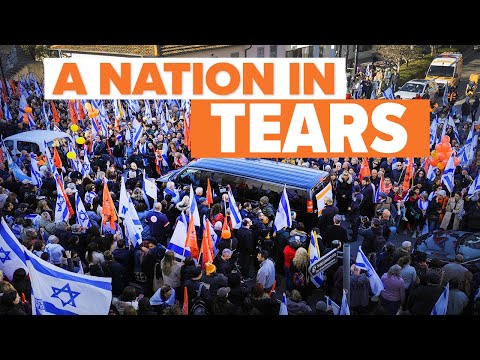In recent weeks, the heartbreaking developments in Israel have left many in the evangelical community grappling with the weight of grief. The funeral of Sheli Beer and her two sons, Ariel and Kfir, has become a poignant reminder of the ongoing conflict and the enormous cost of violence. On October 7th, their family was taken by Hamas in an act of terror that has shaken the nation. The images of helpless children in their mother’s arms have captured the horror of this tragedy, leading to widespread mourning not just in Israel but around the world.
At the funeral, attended by a vast crowd, the pain of loss was palpable. Thousands showed their support for the Beer family, uniting in sorrow over the senseless violence that claimed these innocent lives. Often, it takes such tragic events to bring people together, and in this instance, both Israelis from the left and the right came together to grieve. Even the Knesset, Israel’s parliament, paused for a moment of silence, demonstrating a collective heartache that transcends political divides.
The family’s father, Yarden Beer, who had been released from captivity mere weeks before receiving the tragic news, shared his love for his wife and children during the service. Though he expressed his devastation, he also highlighted the hope for unity in the future. This reflects a biblical principle of finding strength in community and faith during trying times. Many believers draw comfort from the scriptural assurance that even in the midst of grief, God is present, offering solace and support.
While the mourning continues, the situation also raises important moral questions concerning justice and peace. The hostage situation involving Hamas remains ongoing, with the Israeli government balancing difficult decisions about negotiating the release of prisoners. Each choice made has implications for the wellbeing of individuals on both sides of the conflict. It reminds the evangelical community of the need for wisdom and compassion, encouraging prayers not only for those suffering but also for a resolution that honors human dignity and fosters peace.
The reluctance to abandon hope in the face of despair is a thread woven throughout the biblical narrative. For many evangelicals, the desire for peace in the region is not only a political stance but also a deeply spiritual conviction. Prayer for the release of hostages and for an end to violence is paramount. Believers are called to intercede on behalf of all individuals involved, asking for hearts to soften and for an end to the cycle of pain.
In moments like these, the evangelical community rallies not only in solidarity but also in faith, embracing the belief that healing can emerge even from sorrow. The prayer is that through these efforts, transformation may occur in hearts and communities, allowing a future filled with hope and restoration for all involved. As families mourn, the world watches, and the call for understanding and peace resonates, echoing the teachings of love and grace that are central to the faith.



